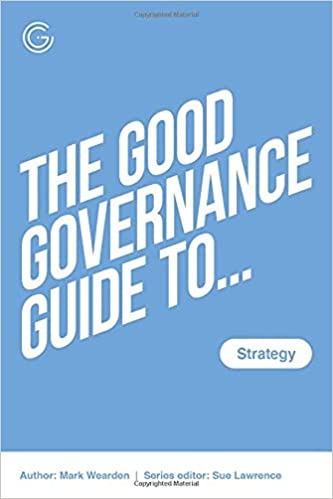search
date/time
 | Cumbria Times A Voice of the Free Press |
4:00 AM 17th July 2021
business
Book Review: The Good Governance Guide To … Strategy By Mark Wearden

Mark Wearden has worked extensively with directors and senior managers from a wide range of different types and sizes of organisations. He provides consultancy, seminars, workshops and lectures on governance and business strategy, helping directors deal with the challenges and contradictions between theory and practice.
The editor of this book and the ‘Good Governance Guide to’ series, Sue Lawrence, is an experienced independent director, holding board, trustee and committee positions in the UK for over 15 years. Sue is a Chartered Director with the Institute of Directors and founder of Independent Directors and Trustees Limited.
The ‘Good Governance Guide to Strategy’ is one of a series of books published by the Chartered Governance Institute (CGI). The CGI assure world class standards of governance by setting the international qualifying standard as the only chartered professional body dedicated to supporting governance professionals. The ‘Good Governance Guide series include guides to Risk, Boardroom Dynamics and, of course, this book on Strategy.
Success in business is reliant on, among other things, a strong strategy. It is an essential foundation for any organisation but developing and implementing strategy can be a challenging if vital responsibility for business leaders. This book gives a comprehensive guide to the topic. It looks in detail at strategic planning and management and highlights the importance of environment, organisational culture and governance structure to a successful strategy.
The book guides the reader through theory and practice with a plenty of hints, tips and advice. There are a multitude of diagrams, with pyramids, 4 box matrix and frameworks galore. Some of the illustrations will be familiar, I think everyone has heard of SWOT analysis but some visuals will be new to the reader and may cast a light on otherwise obscure theories.
The Harvard Business Review defines business strategy as “a set of guiding principles that, when communicated and adopted in the organisation, generates a desired pattern of decision making. A strategy is therefore about how people throughout the organisation should make decisions and allocate resources in order accomplish key objectives. A good strategy provides a clear roadmap, consisting of a set of guiding principles or rules, that defines the actions people in the business should take (and not take) and the things they should prioritise (and not prioritise) to achieve desired goals”.
The Good Governance Guide to Strategy takes the reader through every step of the way and demonstrates not only the ‘what’ but also the ‘why’ and ‘how’ to develop and implement strategy.
The book is split into six parts and takes the reader through the meaning and purpose of strategy, to how strategy requires a change process and the guide supports the reader through this complicated journey.
I found the chapters on ‘business ethics & social responsibility’ and ‘managing strategic change – the people dynamic’ the most interesting and informative for me but each reader most find their own way through the great labyrinth of business strategic theory.
Over the years I have picked up a lot of the strategic theory from people like Porter, Mintzberg, Handy and organisations like McKinsey, Boston Consulting and Blue Ocean Strategy. The great thinkers and think-tanks have contributed to my thinking on strategy but there is so much more in the way of hints and tips, tools and examples that even the most grizzled old business leader will find new knowledge and understanding in the guide.
This is a book that requires a good deal of study and, to get the full effect, needs to be read all the way through. My view is that it’s not some much a book as a self-teach programme that needs time devoted to understanding all the elements of business strategy, how it can be developed and, importantly, how it can be implemented into the readers organisation. It is also essential reading for people who have recently achieved business leader status in an existing organisation and needs to understand that organisation’s business strategy, the whys and wherefores, the relevance (or not) of current strategy and to accept or attempt to evolve the current strategy to drive business success.

If you find this book, and the others in the Chartered Governance Institute guide series, useful, you might want to follow Sue Lawrence’s example and consider the Institute of Director’s ‘Chartered Director’ programme. The Chartered Director qualification is an experience-based assessment. It requires you to evidence how you work within the context of your board, how you use your knowledge and skills to the benefit of the organisation and how you discharge your duties as a director. As the only institute in the world to offer qualifications for directors under Royal Charter, influential figures from business and beyond continue to recommend IoD training for executive and non-executive directors.
I found the guide to be important reading for any business leader and even if you think you are a highly competent strategist, it’s worth a read to refresh and enhance your understanding of this essential element of business success.

Ian Garner
Ian has over 10 years’ experience in strategy and business development with international healthcare organisation Bupa across Australia, Europe, North America, West Africa and South East Asia. He spent 20 years in retail management with travel company Thomas Cook and five years in sales and relationship management roles with Travelex, the leading international foreign exchange business.